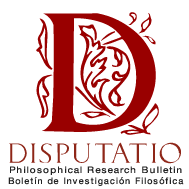Florian Franken Figueiredo
FAPESP, São Paulo & Universidade Estadual de Campinas, Brasil | florian.franken@gmx.de
Received: 30-September-2018 | Accepted: 15-January-2018 | Published: 30-June-2019
Disputatio [Jun. 2019], Vol. 8, No. 9, pp. 00-00 | DOI: 10.5281/zenodo.3236898
Article | [EN] | Full Text | Statistics | Copyright Notice [es] | Vol. 8 No. 9
How to cite this article:
Figueiredo, Florian Franken (2019). «Brandom and Wittgenstein: Disagreements on how to be in agreement with a rule». Disputatio. Philosophical Research Bulletin 8, no. 9: pp. 00–00.
Abstract | This paper offers an interpretation of Wittgenstein’s remarks that discusses the meaning of being in practical agreement with a rule, arguing that Brandom misconstrues the idea undergirding Wittgenstein’s remarks in terms of the relation between the pragmatic and normative aspects of language. First, I discuss Brandom’s idea of normative pragmatism and Wittgenstein’s remarks on rule-following in the Philosophical Investigations. I argue that Brandom enforces the picture of implicit rules as a salient solution for the problem of infinite regress regarding explicit rules. Second, I compare both views and show that although Brandom takes his solution for a Wittgensteinian answer to the regress problem it is very likely that Wittgenstein’s understanding of rule-following rather suggests a different view. Moreover, I explain why Brandom thinks that he cannot accept this view and why he offers an interpretation-based account instead which he thinks is underlying the agreement between rule and practice. Third, I criticize Brandom’s account from a Wittgensteinian point of view arguing that what is underlying the agreement are so-called ‘bedrock-practices’ rather than mutual interpretations.
Keywords | Agreement · Rule · Bedrock · Normativity.
![]()
Wittgenstein y Brandom: desacuerdos sobre estar de acuerdo con una regla
Resumen | Este trabajo ofrece una interpretación de las observaciones de Wittgenstein que reflexionan sobre el significado de estar de acuerdo en praxis con una regla, arguyendo que Brandom malinterpreta la idea que dan soporte a los comentarios de Wittgenstein en cuanto a la relación entre los aspectos pragmáticos y normativos del lenguaje. Primero hablaré de la noción Brandomiana de pragmatismo normativo y de las observaciones de Wittgenstein sobre seguir una regla en Investigaciones Filosóficas. Arguyo que Brandom impone la imagen de reglas implícitas como solución para superar el problema de regreso infinito en cuanto a las reglas explícitas. En segundo lugar comparo ambos puntos de vista y muestro que Brandom, aunque entiende su solución como una respuesta Wittgensteiniana al problema de regreso, es muy probable que, lo que Wittgenstein entiende bajo seguir una regla, más bien sugiere un punto de vista diferente. Explico además por qué Brandom piensa que él no puede aceptar este punto de vista y por qué él ofrece, en cambio, una explicación basada en una interpretación que él piensa es subyace al acuerdo entre regla y práctica. En tercer lugar critico la explicación de Brandom desde un punto de vista Wittgensteiniano, arguyendo que lo que subyace al acuerdo son, así llamadas, prácticas básicas, y no interpretaciones mutuas.
Palabras Clave | Acuerdo · Regla · Prácticas básicas · Normatividad.
References
Brandom, Robert (1994). Making it Explicit. Reasoning, Representing, and Discursive Commitment. Cambridge, MA./London: Harvard University Press.
Hattiangadi, Anandi (2003). “Making It Explicit: Brandom on Rule Following”, Philosophy and Phenomenological Research, vol. 66, num. 2, pp. 419–431. doi: https://doi.org/10.1111/j.1933-1592.2003.tb00269.x
Kant, Immanuel (2016) Kritik der reinen Vernunft. In Werke in sechs Bänden, ed. Wilhelm Weischedel. Darmstadt: Wissenschaftliche Buchgesellschaft.
Kern, Andrea (2010). “Handeln ohne Überlegen”. In: In Sprachspiele verstrickt. Oder: Wie man der Fliege den Ausweg zeigt; Verflechtungen von Wissen und Können, ed. S. Tolksdorf and H. Tetens, Berlin: De Gruyter, pp. 193–220.
Kiesselbach, Matthias (2012). Ethische Wirklichkeit. Objektivität und Vernünftigkeit der Ethik aus pragmatistischer Perspektive. Berlin: De Gruyter. doi: https://doi.org/10.1515/9783110286106
McDowell, John (2001). “How not to read ‘Philosophical Investigations’: Brandom’s Wittgenstein”. In: R. Haller and K. Puhl (eds.) Wittgenstein and the Future of Philosophy. A Reassessment after 50 Years. Vienna: öbv & hpt.
Wittgenstein, Ludwig (1969). On Certainty, ed. G.E.M. Anscombe and G. H. von Wright. Oxford: Blackwell.
Wittgenstein, Ludwig (2009) Philosophical Investigations [PI]. Rev. 4th ed. by P.M.S. Hacker and J. Schulte. Oxford: Blackwell.
© The author(s) 2019. This work, published by Disputatio [www.disputatio.eu], is an Open Access article distributed under the terms of the Creative Commons License [BY–NC–ND]. The copy, distribution and public communication of this work will be according to the copyright notice. For inquiries and permissions, please email: boletin@disputatio.eu.
